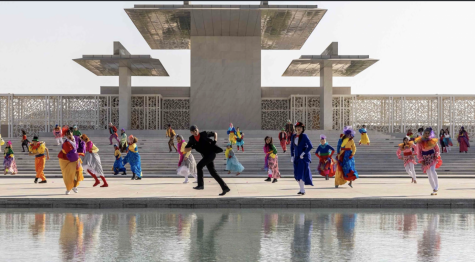Stand for Not Only Who We Are But Also What We Care About

At the author’s request made after initial publication, the words Blacks and whites have been substituted for the phrases Black people and white people.
Racism in Everyday Life
I went to the Qatar National Convention Center earlier this month to receive the first dose of the COVID-19 vaccine. I arrived at the entrance designated for people with an appointment to receive their shots, where I found a large crowd hovering near the gate. While I approached the door, a lady (most probably, a local) officer asked me if I had an appointment. I told her that I did and showed her the text on my smartphone. Looking at PHCC, the Primary Health Care Corporation, as the source of the text message, she quickly assumed that I would go to my assigned primary healthcare center for the vaccine and asked me to leave the place. I was confused and remained there undecided for a few moments. Then, another officer (a male, non-local) came to me, recognized QNCC in the text message, and allowed me in. I approached the reception desk inside. One of the three persons (all-male, non-local) asked me for my Qatar ID and mobile number. After registering me in the system, he told me that I would receive a randomly generated number and would have to wait for that number to call for final registration to be followed by receiving the vaccine. Then, a Black (male, one of many African nationals) security agent directed me towards the back of a hallway behind some three hundred people waiting. After waiting there for about forty minutes, I noticed that the line before me moved very slowly while a few people were being guided towards the final registration counters without them having to wait. I was frustrated at this and asked the security person for an explanation. He told me that the people coming with a prior appointment did not need to wait. When I told him that I had an appointment, he accompanied me to the registration counter.
I am a Brown, Bangladeshi, South Asian male who interacted with both male and female, local and non-local persons of color. There was no white person involved at any stage in my experience. Can we not call my experiences racial profiling? Again, I am not a Black person. Did this save me from being racially profiled?
I have been experiencing various kinds of microaggression daily from the very beginning of my life here. When I first set foot at Northwestern University’s doorsteps in Qatar, I was stopped at the entrance by a security guard (a male, Nepali, South Asian) and was asked to hand over my passport. However, I needed my passport to take into the building for Human Resources to initiate my paperwork. I had to call the security supervisor and explain my situation before I was allowed in. Even when I landed at Hamad International Airport, our asking for directions to the Al Maha lounge was ignored by three South Asian employees before we finally got help from a Filipina agent. All of those experiences were racial profiling against me – a Brown, Bangladeshi, and South Asian man. And none required a white man to inflict such racist violence, and my non-Blackness did not save me from being racially treated.
Neither an absence of a white oppressor nor my South Asian identity saved me from being racially profiled. At the same time, a non-Black identity did not prevent one from being racist against me. This contradicts the commonsensical understanding of racism in terms of social identities such as white, Black, and brown. If racism does not correspond to skin-color, what is racism, anyway?
The Working Group on Race is not a White men’s club
A recently published an op-ed on the Daily Q titled “A Case Against Performative Activism: The Revolution Will Not be Webinar-ized” caught my attention. In this column, the author, Nadege Bizimungu, called out one of the white professors at NU-Q for racist conduct in the class. While recognizing the act of reading out loud the n-word in the title of a book as a microaggression, I find the narrative she presents in the rest of the piece problematic on several accounts: generalizing about the entire NU-Q faculty as white, depicting the “the Working Group on Race” (I will explain below why I put this within inverted comma) as a white men’s club involved in “Performative Activism” without really doing anything meaningful, and finally, construing racism as essentially against Black people by the non-Black people.
The narrative in the op-ed conflates several facts with assumptions that I need to clarify before explaining its problems. First, the public statement against professor Jocelyn Mitchell’s racism did not represent all the faculty involved in the “Working Group on Race” nor the Liberal Arts program. The statement was signed by eight faculty members in the Liberal Arts program, including some members and non-members of the group. Moreover, some members of the group did not sign the statement, but they worked to garner support in making similar public statements released by their respective programs. Secondly, we call WGR a working group. However, it is – in fact – not a working group like any other working group active at NU-Q because its formation and functions are independent of the institution. We – a few of the NU-Q faculty, including white and non-white persons of both genders from several nationalities – formed this loosely defined faculty group primarily to create a platform to discuss the problem of racism and stand by those fighting racism. While we have some leverage as faculty members of NU-Q, this group does not have any authority to act like other working groups due to the lack of institutional mandate. Thus, our current actions are primarily symbolic. Thirdly, we – the members of the WGR – differ in opinion regarding whether to seek an institutional mandate. I do not want the WGR to be part of the institution. The gain in authority for the group to do something comes with many institutional policies that would likely curtail our ability to talk about racism.
By now, it should be clear why the WGR cannot be held accountable for the microaggression mentioned at the beginning of the op-ed. However, let me now explain why calling out the group due to its purported role in Mitchell’s racism issue specifically, and racism in general, is unacceptable and potentially misleading.
The author of the op-ed wrote, “As someone who has been at the forefront of a lot of community organizing for Black students in our community, I couldn’t help but question why these faculty members never issued any public statements in response to ASA’s requests, but suddenly changed two months later to condemn Mitchell’s comments, and decided to quote our statement while doing so, knowing perfectly well they never really issued a statement on behalf of the ASA’s requests before.”
Let me clarify, the WGR did not take any public position against Jocelyn Mitchell’s case, but we discussed this at length amongst ourselves. The public statement condemning her racism came from eight faculty members in the LA Program. It was undoubtedly a symbolic act. Nevertheless, what followed demonstrated the power of our symbolic activism: the first-ever NU-Q official statement of condemnation of the particular acts of racism in question and racism in general, similar public statements from both the Journalism and Communication programs, and finally, the accused person’s withdrawal from the QNRF-funded research project. So, while I recognize that the WGR, perhaps, did not do enough, and potentially is unable to do as much as we would like to, in terms of concrete, on-the-ground activism, we have seen the proof of the effectiveness of our symbolic activism.
Moreover, we continuously discuss racism and other related issues within the group that supported many tangible acts, including the introduction of an African Studies minor. I agree with the idea that the WGR and the NU-Q at large need to do more in combating racism. However, our efforts’ dismissal by defining those as mere eyewashing of racist white professors is untenable and simply frustrating. It is more disappointing to see criticisms of the anti-race conversations we are trying to cultivate while simply writing demands and attacking the WGR with straw man logic.
Combating racism does not need identity politics
As my experiences mentioned at the beginning show, racism does not always need a white person engaging in the horrible acts of racial profiling against a Black person. Therefore, racism cannot be accurately defined as essentially anti-Blackness. For, contrary to the commonsensical understanding, being Black neither automatically makes one the victim, nor precludes her/him from being the aggressor. The Human Rights Watch reported dozens of racist attacks on South Asians by Black locals in South Africa. The Guardian also published news reports with graphic pictures of Black Africans attacking Bangladeshis in South Africa. Furthermore, most of the South Asian and other Asian migrants in the Gulf countries would be able to give examples of being racially profiled by Black people among the locals, who constitute a significant proportion of the citizenry in this region. While the dominant form of racism is anti-Blackness in the US and other white-majority European countries, the same does not apply universally. Racism does not always involve a white person in power and some powerless Black individuals. Simply because the world population distribution is much more diverse than a neatly designed white/Black dichotomy. Racism, instead, rests on socio-cultural inequality structures as recognized by political economy and ideological hegemony as recognized by cultural studies.
I recognize a good deal of Orientalization in the op-ed’s essentialization of Black people as the archetypal victim of racism while putting all “non-Black people” in the category of the oppressor. Such an understanding inevitably leads to identity politics that thwarts collective action against racism. For social identity is not fixed, but it is protean, which is well-explained in the idea of intersectionality. Therefore, fixating on Black people as the victim of racism runs the risk of dismissing racism against other groups as well as within the same group, such as intra-Arab racism and intra-Brown racism. The case of professor Mitchell offers a helpful example of such dismissal.
It has become public knowledge that professor Mitchell shared racist slurs against Qataris and some migrant groups, including South Asians. While she apologized for this to a closed town-hall meeting at NU-Q, the larger community did not hear about what consequences she suffered for her racism. Then, the news of her being awarded a $700,000 grant to study Qatari female entrepreneurs resulted in anger and frustration among the locals due to the perceived absence of consequences for a white, American professor for her prior racist act. Moreover, the research grant generated an idea among the locals – as apparent in social media and local news reports – of the accused scholar being rewarded instead of being punished. Thus, the Qataris have every right to feel offended and to express their frustration. On what ground can one dismiss them of this, right? If being once in place of an oppressor disqualifies an entire group (in this discussion, the Qataris) from claiming victimhood of racism, where would Black people – in South Africa, for instance – belong given the incidents mentioned above of their racial attacks against the non-Black people?
The conceptualization of racism as anti-Blackness is, therefore, factually inaccurate and morally questionable due to its counterproductive consequence. For instance, the op-ed questions why those eight faculty members (inaccurately described as members of the WGR) condemned professor Mitchell’s racist act when there was no similar statement on behalf of the African Students Association just a few months ago. The narrative appears to have dismissed the fact that the WGR came to exist precisely in response to the ASA’s call for support. As I noted above, we have formed the WGR as an informal platform for discussions and collective actions within our institution’s limitations.
The dismissal of the local community’s frustration of and protest against the particular act of racism and the WGR’s efforts addressing the problem is not only disruptive of a broad-based coalition in fighting white privilege but also is morally questionable. For instance, how would someone active in the anti-racism movement choose to call out a group for condemning racism? This is problematic even from a collective identity perspective, given the racist act was against women among both the locals and migrants.
Indeed, the current global movement against racism in the form of Black Life Matters is spurred by the murder of George Floyd in the U.S. However, one cannot define the Black identity as the universal victim. Black people are neither the only victim of racism nor is it impossible for her/him to assume the oppressor’s position. Understanding racism essentially as aggression, both overt and micro, against Black people by non-Black people misconstrues the reality of racism and inevitably undermines collective action in fighting racism. The BLM movement in the U.S. failed to receive a similar level of attention in Qatar or most African countries because the core of racism in these countries takes different forms than anti-Blackness. All these countries in Africa, Asia, and elsewhere certainly have their share of racism. Nevertheless, their racism does not necessarily involve anti-Black racism in the absence of a dominant white group in these countries.
I agree with the op-ed on the falsehood of the idea that “I am oppressed so I can’t be racist.” A victim in one context can very well be the oppressor in another context as my own experiences at the beginning of this piece show. This is precisely why we need intersectionality in understanding racism that goes beyond the narrow definition of racism as anti-Blackness, which inadvertently dismisses wide varieties of racism (such as nativism, colorism, etc.) and sometimes misconstrues the oppressor as victims, as in professor Mitchell’s case.
Moving Forward
I agree with most of the recommendations the op-ed proposes to move forward, despite my disapproval of its dismissal of the feeling of those being racially profiled and the genuine efforts of the WGR in combating racism.
In line with the well-known quotation from Audre Lorde’s words, “the master’s tools will never dismantle the master’s house,” I argue that transposing anti-racism ideologies and activisms from the US in fighting racism in the Gulf or elsewhere does not help. Moreover, the uncritical adoption of anti-Blackness as the major form of racism in the Gulf region will likely pit the minorities among non-Black people against one another by encouraging one to unwisely siding with the oppressor (for example, a white, American professor) while dismissing potential collaborations (for instance, the locals and the South Asians). Furthermore, this involves the risk of discouraging a non-Black faculty in teaching classes addressing racism for being called out by the BLM activists who ironically would appear to stand by white racism.
I also agree with the op-ed that, “In Qatar, there is racism and anti-Blackness targeting Black immigrants, Black Qataris, citizens of African descent, sub-Saharan refugees, migrant workers from South Asian countries, etc.” What I would like to add is an intersectional analysis of racism, which correctly recognizes one’s position in the categories of the victim and the oppressor. Racism operates in the Gulf, as any other region in the world, essentially in a combination of multiple social factors. Blackness alone does not always make one vulnerable to racist encounters. Blackness does not automatically prevent someone from being the oppressor either. A Black-local-Qatari-citizen and a Black-American-citizen in Qatar cannot possibly be a victim of racism vis-à-vis a non-Black South Asian. Again, a Black-professional-male-American can very well act in racist ways towards a Black-female-domestic worker from an African country. An adequate understanding of racism in the Gulf regions and elsewhere must take into consideration social class, nationality/citizenship and gender besides an individual’s skin color.
Thus, the determinants of racism are multiple and act in different combinations in particular contexts. Anti-Blackness is the dominant form of racism in the US context, and therefore, the BLM emerges as the core of the anti-racism movement. However, Black people constitute a tiny portion of the population in South Asia, and white people are almost absent. Nevertheless, the region is one of the most racially divisive and violent in the contemporary world. Defining racism in terms of the Black/white dichotomy falls flat in addressing racism within South Asia.
We must integrate “who we are” with “what we stand for.” Highlighting who we are alone would inevitably lead to factual inaccuracies, strategically harmful moves, and morally questionable positions. Highlighting the moral cause (i.e, racism) can help us avoid siding with the oppressor while dismissing the potential allies among other likely victims. Moreover, this emphasis on the moral cause will help us avoid identity politics and move away from the intersectionality of racism onto the ‘intentionality’ of the actors. Someone becomes a racist not just because s/he is a wrong person, and by implication, cannot be a racist because s/he is a person with good intentions. Racism essentially involves unequal power relations between individuals whereby the one with power may end up being racist. In contrast, the one without power cannot become racist even when s/he wants to do so.
Moreover, racism is not about personal feelings, and therefore, fighting racism does not matter whether a person feels good or bad. We must stand against the racist and for the victim regardless of how we identify ourselves with both the oppressor and the victim.
The author is an assistant professor in residence with the Liberal Arts Program at NU-Q, where he teaches Sociology. He is one of the eight faculty signatories of the first public statement condemning racism and a member of the Working Group on Race (WGR). Race and Racism is one of the sociology courses he teaches at NU-Q. His views in this piece are his own and do not represent those of a Working Group on Race or the editorial stance of the Daily Q.












